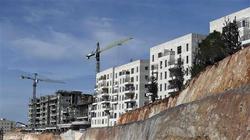 Israeli prime minister Benjamin Netanyahu has announced plans to construct thousands of new settler units in occupied East Jerusalem al-Quds, two weeks prior to a general election due to be held by the Israeli regime.
Israeli prime minister Benjamin Netanyahu has announced plans to construct thousands of new settler units in occupied East Jerusalem al-Quds, two weeks prior to a general election due to be held by the Israeli regime. RNA - “I have huge news today -- we're adding another 2,200 units to Har Homa [settlement in southern East Jerusalem al-Quds],” the Israeli premier said in a video message posted by his office on Thursday.
The controversial Har Homa Jewish community was first set up in 1997, during a previous Netanyahu's premiership.
Netanyahu added in his message that he had approved the initial construction of the units “despite objections from the entire world” and that he had estimated that Har Homa's population would reach 50,000 from its current 40,000 when the new units were completed.
The Israeli prime minister also announced his approval to construct an entire new settlement with several thousand units in Givat Hamatos, a settlement which hosts Ethiopian Jewish and Russian immigrants and is situated next to the mainly Palestinian East Jerusalem al-Quds neighborhood of Beit Safafa.
Netanyahu added that the new settlement would include 3,000 units for Jewish settlers and 1,000 “for the Arab residents of Beit Safafa.”
Peace Now, an Israeli anti-settlement group that monitors settlement activity in the occupied West Bank, has said the contentious Givat Hamatos project would interrupt “territorial continuity between Bethlehem and East Jerusalem [al-Quds].”
According to Peace Now, Netanyahu who is currently leading a caretaker cabinet after two elections failed to produce clear winner lacked the required mandate to approve the controversial projects.
Through using the settlement projects as a pre-election tactic, Netanyahu is apparently trying to secure his re-election at a third vote scheduled to take place on March 2.
‘Netanyahu tries to win votes at expense of Palestinian rights’
In reaction to the Israeli prime minister’s provocative settlement projects, the Palestinian Authority issued a statement, saying Netanyahu’s new settlement projects would only bring more tension and violence to the already tense region.
“Netanyahu's attempts to win right-wing Israeli votes on the eve of the Israeli elections at the expense of Palestinian rights will not bring peace and stability to anyone, and will lead to more tension and violence in the region,” said a statement from a spokesman for Palestinian President Mahmud Abbas.
Recent polls predict yet another close race between Netanyahu’s right-wing Likud and the centrist Blue and White party led by Benny Gantz, with neither side expected to win an outright majority.
The occupying regime seized East Jerusalem al-Quds in the 1967 Six-Day War. It later annexed the territory in a move never recognized by the international community. Around 600,000 Israeli settlers now live in over 230 settlements built in the occupied Palestinian territories of the West Bank and East Jerusalem al-Quds.
The Palestinian Authority wants the West Bank as part of a future independent Palestinians state, with East Jerusalem al-Quds as its capital. The continued expansion of Israeli settlements is one of the major obstacles to the establishment of peace in the Middle East.
US President Donald Trump infuriated Palestinians last month, when he unveiled his much-delayed and self-proclaimed “deal of the century” during an event at the White House alongside Netanyahu.
Palestinian groups have unanimously rejected Trump’s one-sided plan, which largely meets Israel’s demands in the decades-old conflict with the Palestinians while envisioning a Palestinian state with limited control over its own security and borders.
The so-called “peace” plan enshrines Jerusalem al-Quds as “Israel’s undivided capital” and allows the regime to annex settlements in the occupied West Bank and the Jordan Valley. The plan also denies the right of return of Palestinian refugees to their homeland, among other controversial terms.
Trump’s plan has triggered waves of protest rallies both across the Palestinian occupied territories and around the globe.
President Abbas has already severed ties between the Palestinian Authority which he heads and the Israeli regime as well as the US in reaction to Trump’s scheme.
Apart from the Palestinian leaders, many other international blocs and organizations, including the European Union (EU), the Organization of Islamic Cooperation (OIC), and the African Union (AU), have rejected Trump’s plan.
847/940